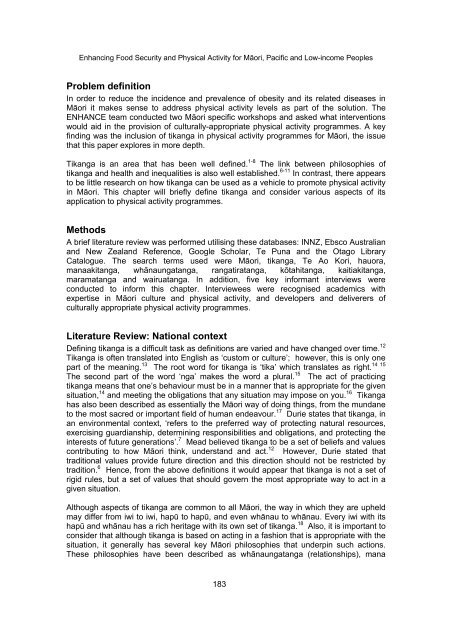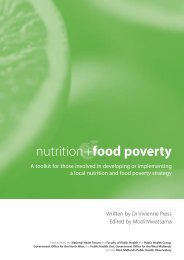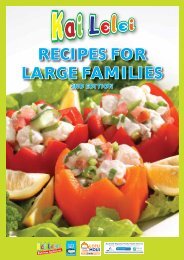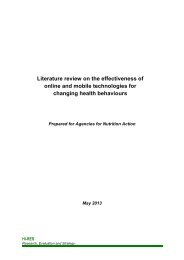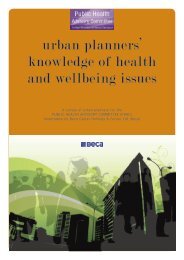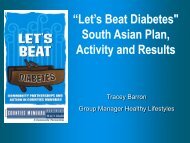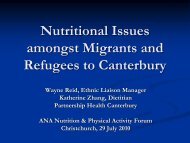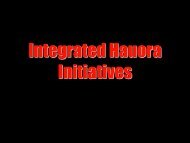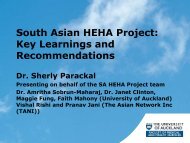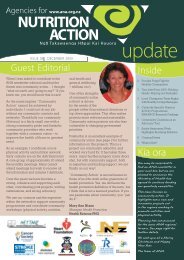enhancing food security and physical activity for maori, pacific and ...
enhancing food security and physical activity for maori, pacific and ...
enhancing food security and physical activity for maori, pacific and ...
- No tags were found...
Create successful ePaper yourself
Turn your PDF publications into a flip-book with our unique Google optimized e-Paper software.
Enhancing Food Security <strong>and</strong> Physical Activity <strong>for</strong> Māori, Pacific <strong>and</strong> Low-income PeoplesProblem definitionIn order to reduce the incidence <strong>and</strong> prevalence of obesity <strong>and</strong> its related diseases inMāori it makes sense to address <strong>physical</strong> <strong>activity</strong> levels as part of the solution. TheENHANCE team conducted two Māori specific workshops <strong>and</strong> asked what interventionswould aid in the provision of culturally-appropriate <strong>physical</strong> <strong>activity</strong> programmes. A keyfinding was the inclusion of tikanga in <strong>physical</strong> <strong>activity</strong> programmes <strong>for</strong> Māori, the issuethat this paper explores in more depth.Tikanga is an area that has been well defined. 1-8 The link between philosophies oftikanga <strong>and</strong> health <strong>and</strong> inequalities is also well established. 6-11 In contrast, there appearsto be little research on how tikanga can be used as a vehicle to promote <strong>physical</strong> <strong>activity</strong>in Māori. This chapter will briefly define tikanga <strong>and</strong> consider various aspects of itsapplication to <strong>physical</strong> <strong>activity</strong> programmes.MethodsA brief literature review was per<strong>for</strong>med utilising these databases: INNZ, Ebsco Australian<strong>and</strong> New Zeal<strong>and</strong> Reference, Google Scholar, Te Puna <strong>and</strong> the Otago LibraryCatalogue. The search terms used were Māori, tikanga, Te Ao Kori, hauora,manaakitanga, whānaungatanga, rangatiratanga, kōtahitanga, kaitiakitanga,maramatanga <strong>and</strong> wairuatanga. In addition, five key in<strong>for</strong>mant interviews wereconducted to in<strong>for</strong>m this chapter. Interviewees were recognised academics withexpertise in Māori culture <strong>and</strong> <strong>physical</strong> <strong>activity</strong>, <strong>and</strong> developers <strong>and</strong> deliverers ofculturally appropriate <strong>physical</strong> <strong>activity</strong> programmes.Literature Review: National contextDefining tikanga is a difficult task as definitions are varied <strong>and</strong> have changed over time. 12Tikanga is often translated into English as ‘custom or culture’; however, this is only onepart of the meaning. 13 14 15The root word <strong>for</strong> tikanga is ‘tika’ which translates as right.The second part of the word ‘nga’ makes the word a plural. 15 The act of practicingtikanga means that one’s behaviour must be in a manner that is appropriate <strong>for</strong> the givensituation, 14 <strong>and</strong> meeting the obligations that any situation may impose on you. 16 Tikangahas also been described as essentially the Māori way of doing things, from the mundaneto the most sacred or important field of human endeavour. 17 Durie states that tikanga, inan environmental context, ‘refers to the preferred way of protecting natural resources,exercising guardianship, determining responsibilities <strong>and</strong> obligations, <strong>and</strong> protecting theinterests of future generations’. 7 Mead believed tikanga to be a set of beliefs <strong>and</strong> valuescontributing to how Māori think, underst<strong>and</strong> <strong>and</strong> act. 12 However, Durie stated thattraditional values provide future direction <strong>and</strong> this direction should not be restricted bytradition. 6 Hence, from the above definitions it would appear that tikanga is not a set ofrigid rules, but a set of values that should govern the most appropriate way to act in agiven situation.Although aspects of tikanga are common to all Māori, the way in which they are upheldmay differ from iwi to iwi, hapū to hapū, <strong>and</strong> even whānau to whānau. Every iwi with itshapū <strong>and</strong> whānau has a rich heritage with its own set of tikanga. 18 Also, it is important toconsider that although tikanga is based on acting in a fashion that is appropriate with thesituation, it generally has several key Māori philosophies that underpin such actions.These philosophies have been described as whānaungatanga (relationships), mana183


